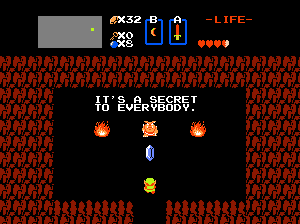It's a Secret to Everybody
 Wednesday, March 5, 2008 at 12:59AM
Wednesday, March 5, 2008 at 12:59AM Nobody wants to know who dies in their favorite story or what the twist is at the end of the summer blockbuster if they haven't gotten around to reading/watching it yet. Along the same lines, I've found that there are people who don't like to be told what to do in a game because they believe "figuring it out" is half the fun. This pet peeve for gamers goes as far as some players skipping tutorials, and snapping at those who offer advise (or at least ignoring them). Certainly in the majority of puzzle games "figuring it out" is all of the fun, and giving the player puzzle solutions destroys the gameplay experience for them. However, for all of the genres based on action, mechanics, and skill, being told how to do something still leaves the player with the challenging task of executing the action.
Unlike other mediums, games sustain an interactive relationship with the player(s). Even the most simple games are quite complex when you think about it. Some games are quite deep and complex that there is no way for the developers to include a tutorial for everything. There are some techniques and moves in games that the developers didn't even know about when they made the game. This evolutionary quality of gameplay is known as emergence. Like a biological mutation that stems from a single offspring in a given generation, when a game is released, the hundreds of thousands or millions of players are all working the game over in countless ways. And when one person finds out you can hop over the walls in Wario's Stadium twice to get an overall race time of 21 seconds, or when you can slide gracefully along the floor in Super Smash Brothers Melee by air dodging diagonally downward, the internet does a remarkable job of getting this information to the world. Like a virus or beneficial mutation, these "secrets to everybody" spread.
Ignoring everything the developers is unaware of, what about the things they deliberately programmed in? Masahiro Sakurai has maintained his personal blog for Super Smash Brothers BRAWL since last summer. He has covered everything from items, characters, techniques, and stages for his game. Yet, even though he has revealed specific ways to use specific moves with specific characters, he admits himself that he doesn't want to get too technical. It is obvious that this particular game reaches a wide audience some of which wouldn't be interested in the technical side of games. However, the game is rated T for teen. I feel that thirteen-year-olds are old enough to handle technical information. And furthermore, what's the harm for sneaking in a few lines of it anyway.
"I’ll try not to get too technical with things, but just know that there are lots of small tricks like these for you to play around with." ~Sakurai
At the end of the day, games are complex computerized machines that have a wonderful coating of graphics filled with familiar forms to bridge the gap of communication between the bit world of computers and the human world of the real. In other words, games are high tech and we shouldn't be afraid to be more explicit when talking about them and teaching the player how to play.
The best example I have of a game that teaches how it works is Team Fortress 2. This game features a commentary mode where players can run around the multiplayer maps activating commentary audio files from the developers. These audio blurbs talk about everything from lighting and shadows, character classes, the forms that fit their functions, level lay out, and more invisible things like how the respawning system works and why they took out elements from the previous game in the series. Not only was this information highly informative, but it was entertaining, it helped to reduced the high amount of information that is needed to begin playing the game, and I was still in complete control over what I wanted to listen to. If I were a gamer that didn't like technical talk, I could simply avoid listening to those commentary files. As a game designer, this kind of commentary is gold. Just hearing the developers talk about the tactics and strategies they designed into the game helped me organize the concepts in my own mind. My sister, after hearing the commentary, began playing better and smarter in Call of Duty 4. Though the games are both FPSs, they are very different. Regardless, from listening to the commentary she now has a much clearer concept of high-ground and low-ground and their advantages, which keeps her alive longer in COD4.
Just coming out straight and telling the player how to play can't be a bad thing when you don't force the player through the information. Even the "Try This" videos in Donkey Kong Jungle Beat do wonders for giving the player just enough inspiration and curiosity to expand the way they play the game.
If you're developing a game out there, don't be like that mean kid who, when he finally gives you a turn to play the game, doesn't tell you any of the controls and proceeds to immediately beat you down. And at the same time, don't be like the hard cover strategy guide that turns a game into a reading comprehension exercise.
Find the balance. Find the way to make your game a secret to everybody.




Reader Comments